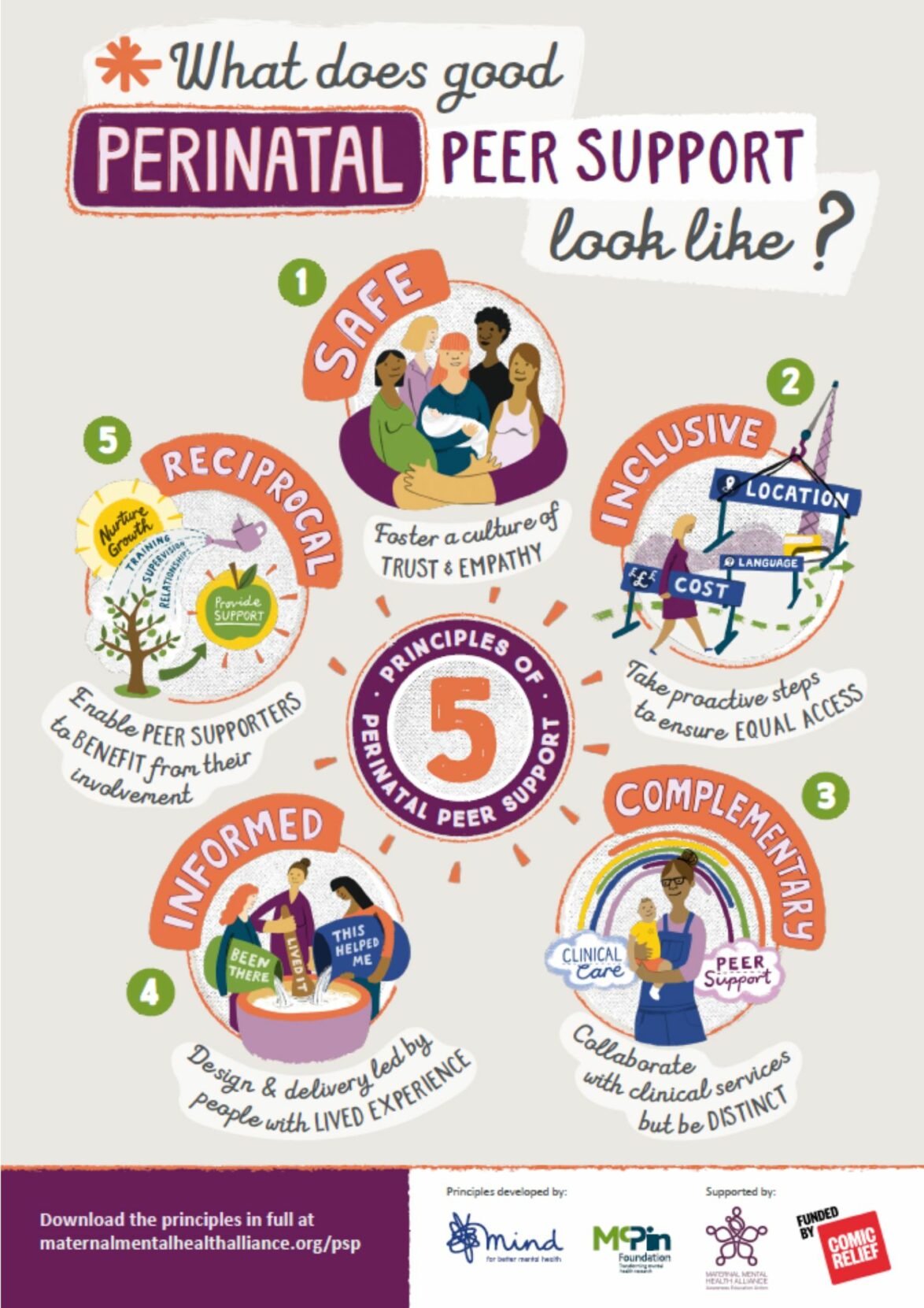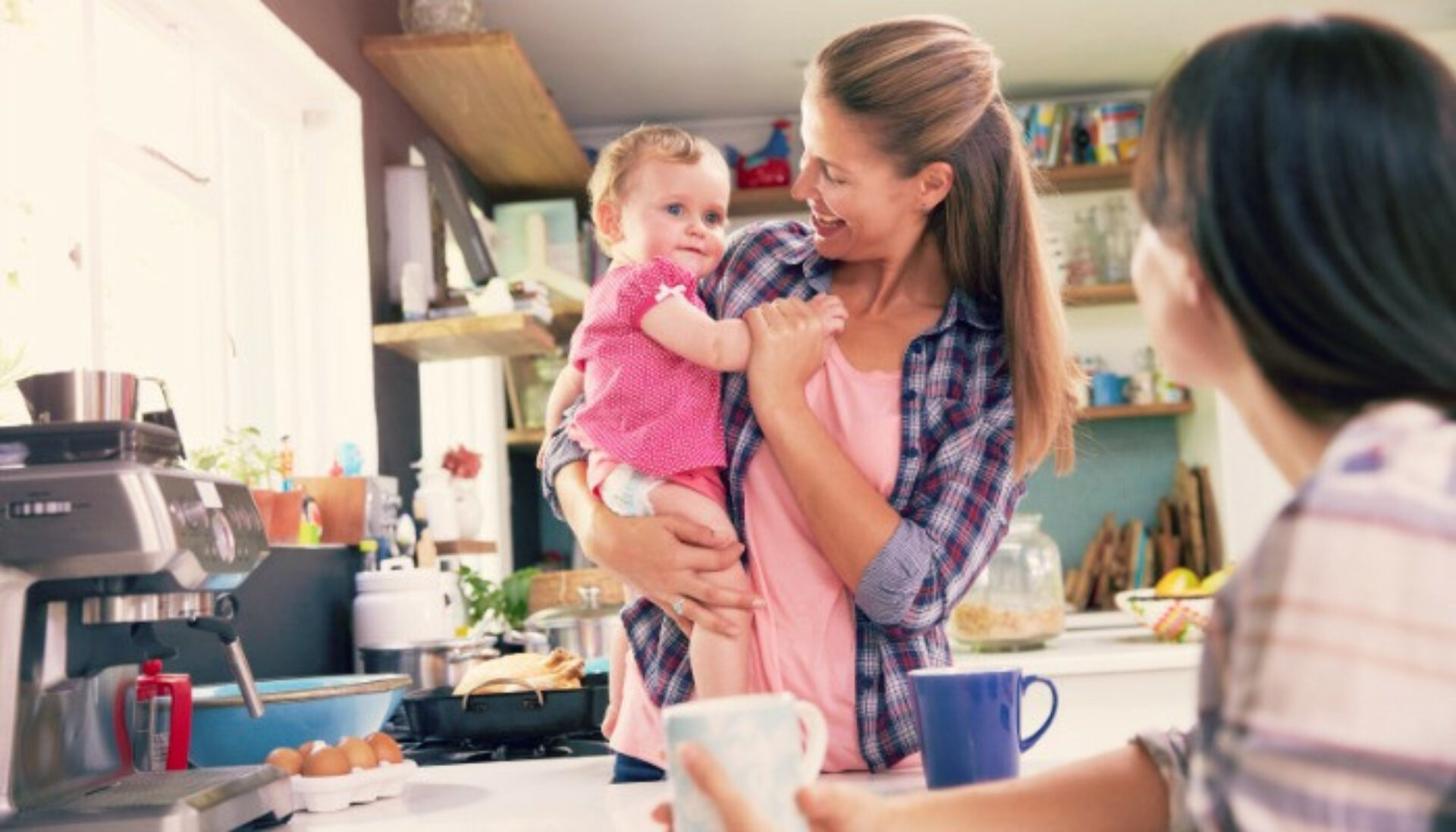Laura Wood
What does good peer support for new mums look like? How can support from people with shared experiences meet the unique needs of mothers and babies? How can those who facilitate peer support during this important time ensure that it’s safe, inclusive, and helpful?
These are big questions. As part of a team tasked with compiling a set of guidelines, I’ve spent almost a year asking them.
We asked mums and families, midwives and health visitors, people working in clinical perinatal mental health services, charities and other organisations facilitating peer support for parents… anyone with relevant experience.
We brought them all together in very large rooms and took notes furiously as they discussed their experiences. Now we’d like to share what they told us.
I am one of three lived experience facilitators on this project. We worked with staff from the McPin Foundation and Mind to co-design perinatal peer support principles that would support people to create and deliver peer support that truly meets the needs of women affected by mental health difficulties during and after pregnancy.
We held three consultation events, in Birmingham, London and Newcastle, and three focus groups in Scotland, Northern Ireland and Wales. Online surveys were available for people who couldn’t attend.
We invited people from as many under-represented groups as we could. McPin also did some interviews with perinatal peer support providers to discuss the logistics of offering such support in more depth.
Safe peer support
The result is five principles accompanied by explanatory notes and reflective prompts to get people to think about how they can be met whether you’re online, half a dozen mums in someone’s living room, or a large charity.
Using this guidance will help to ensure that your peer support is safe, inclusive, informed, that it benefits everyone involved, and remains distinct from – but connected to – clinical perinatal mental health services.
You can access the principles online, along with a more detailed report about the findings, via the website for the Maternal Mental Health Alliance.
I hope that these principles will make safe, welcoming, nurturing peer support accessible to more mums who need it.
I believe that they will as lived experience has been at the heart of the project. Because the principles were co-created with women and families who have lived through perinatal mental health difficulties, they are shaped around their needs, not what others imagine those needs to be.
Treating lived experience as equal partners
My own experience has informed the work. In 2014, I emerged from a psychiatric mother and baby unit, dazed and scared, and was promptly dropped by the community mental health team.
It was other mums who pulled me through, namely my friend Hayley from NCT classes and everyone who participated in Rosey Adams’ #PNDFamily on social media. I know that peer support, done right, can be lifesaving and can set you up, as a parent, to know and trust yourself and your baby.
Staff from McPin and Mind treated me and the other lived experience facilitators as equal partners in designing and delivering the project. I hadn’t expected this and it was an absolute game-changer – for me personally and for the final principles.
Our approach couldn’t be called co-production as the structure and timeline of the work was established before I came on board and we weren’t able to conduct the interviews or write the principles themselves, but staff intentionally gave us as much agency as they possibly could at every opportunity. (True co-production occurs when every stage of the project is done collaboratively).
This meant that we were invited to the table whenever there was a decision to be made. We met with the funders. We networked and promoted what we were doing. We designed and delivered every detail of those events and focus groups.
We gave feedback on everything we couldn’t actually do ourselves within the parameters of the project, and changes were made accordingly. Budgets were managed so that we were paid fairly for our time, which made me feel valued and valuable, and enabled us to do the work justice.
Spreading the word
I’m awed that hundreds of people – mums, especially – gave up their time to share their expertise with us. Everyone who participated was so passionate and invested in good perinatal peer support.
Many went above and beyond, emailing me resources to inform the work and checking in regularly to ask how it was going. It was a privilege, and very validating, to be their point of contact and to be associated with a piece of work which they recognised as so important and so needed.
The principles have now been developed, tested, and launched. We presented them at Peerfest, Mind’s annual celebration of peer support, in Birmingham on 3rd December and held a workshop with some activities and discussion so that we could all get stuck in.
I’m so excited that the principles are ready, and I’m now leading the team in ‘disseminating’ the work – which means making sure that all the wonderful knowledge which people so generously and so enthusiastically shared gets out to where it will be useful.
We’ll be touring with more workshops and presentations throughout 2020: drop an email to [email protected] to subscribe to our mailing list.
Download the perinatal peer support principles here.
Pre-order Laura’s book on maternal mental health here, and follow her on Twitter @cooksferryqueen.

